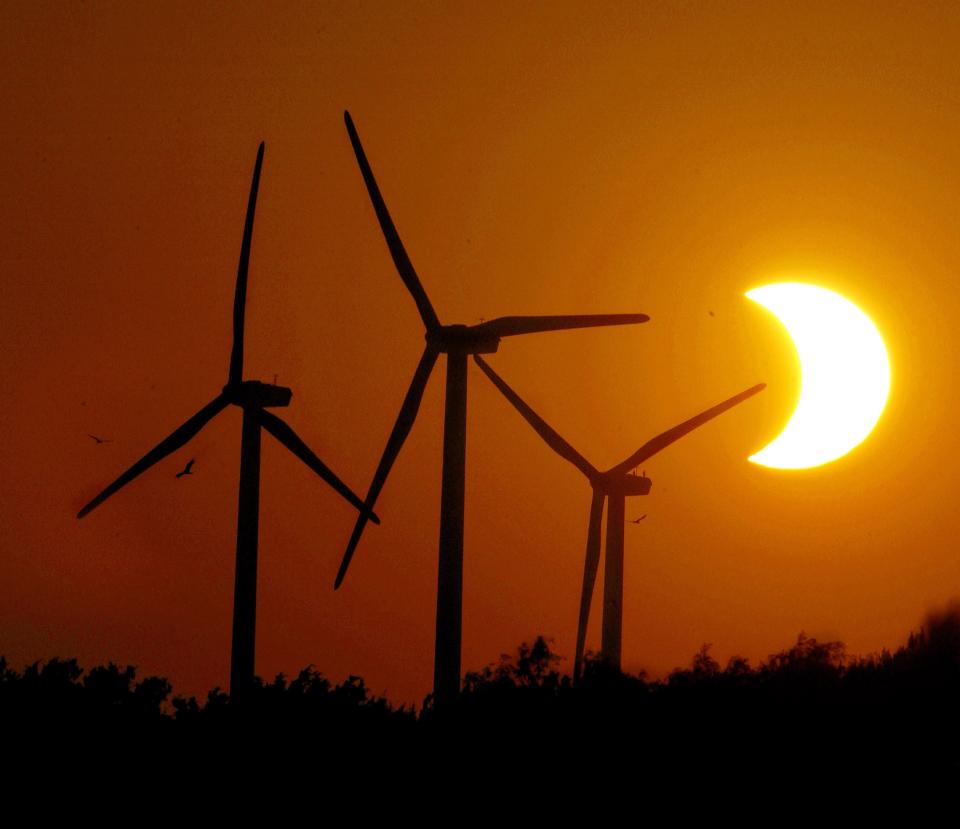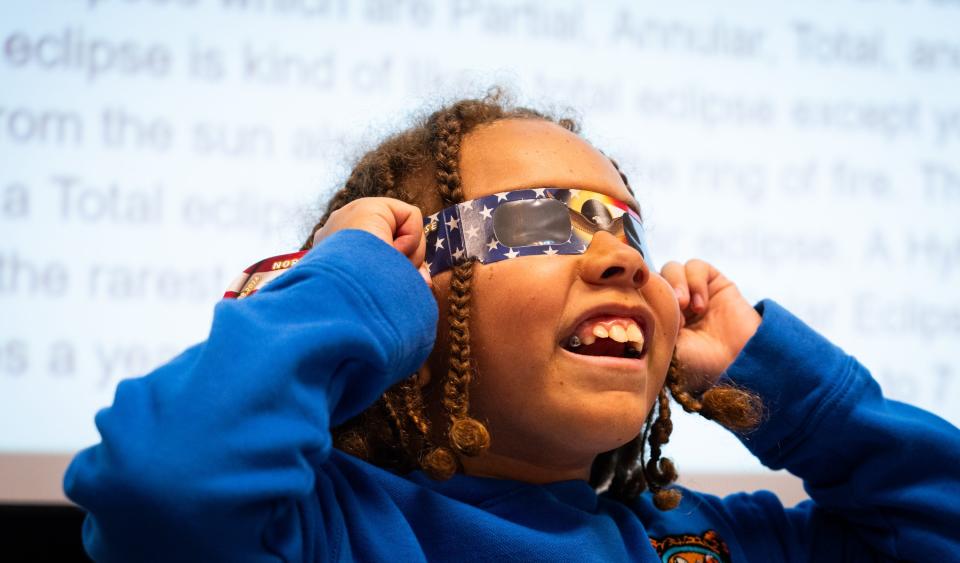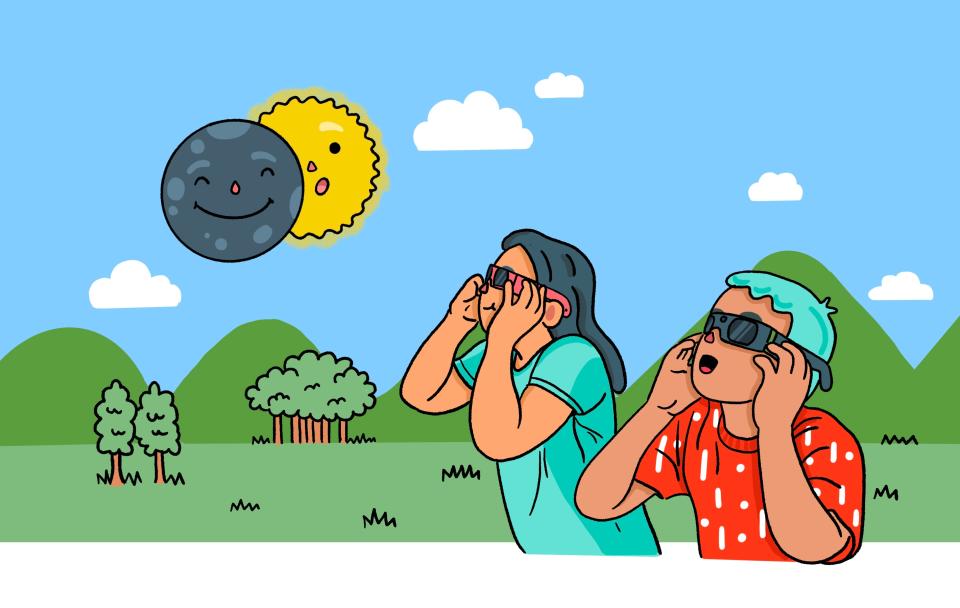Solar eclipse 2024: Latest look at what could be a cloudy forecast for Monday
T-minus 4 days.
On Monday afternoon, a total eclipse of the sun will cross over a dozen states as it traverses from Texas to Maine. Millions of people are expected to travel to see it.
Indeed, for just the second time in seven years, day will suddenly become night for a few brief, wondrous minutes as the orbiting moon blocks the sun's light along a southwest-to-northeast path across the continent.
But where will clouds ruin the spectacle?
Here's the latest 'bad news' weather forecast
AccuWeather long-range expert Joe Lundberg said places along or near the path of totality that will have poor viewing conditions appear to be from Missouri and Kansas southward into central and east Texas, where it is likely to be rather cloudy with showers and perhaps some thunderstorms.
The Weather Prediction Center (WPC), a branch of the National Weather Service, agrees, predicting that "cloud cover in the path of totality continues to look most likely from Texas through southern Arkansas, as well as for portions of the Ohio Valley, including Ohio and northwest Pennsylvania."
In addition to the clouds, the WPC also forecasts stormy weather: "Rain showers and thunderstorms are becoming more likely across Texas, Oklahoma, and Arkansas. Some of the storms may become severe Monday night."
The National Weather Service in Austin/San Antonio, Texas, said Wednesday that "this is generally a bad news event for stargazers, or um, eclipse watchers."

Where are clear skies expected?
Clear skies in the path of totality are most likely in northern New England and upstate New York and have become more likely from southern Missouri into central Indiana, the Weather Prediction Center said.
Weather.com meteorologist Jonathan Erdman predicts that "northern New England could have some of the best weather in the country for viewing."
The National Weather Service in Burlington, Vermont is also on board with the good forecast, saying that "dry conditions and mostly sunny skies in the Northeast will make for favorable conditions for viewing the total solar eclipse."
Vermont braces for the expected onslaught of visitors
On Monday, itty-bitty Vermont is going to feel much more crowded.
Leading up to the solar eclipse, nearly a quarter million visitors are expected to swarm the Green Mountain State because of its position within the path of totality.
To avoid the heavy traffic and overall chaos of the day, the Vermont Agency of Transportation advises Vermonters to “hunker down” and forego driving on April 8 if they can help it. Many northern Vermont schools and some businesses, for instance, are taking heed and closing for the eclipse.

Is it safe to drive during an eclipse?
It's safe to drive during an eclipse as long as you don't look up at the sky. AAA is telling drivers to be focused on the road if they are operating a car during the total solar eclipse.
"Anyone operating a vehicle should not be attempting to look up at the sky during the eclipse – their eyes should be on the road," said Aixa Diaz, a spokeswoman from AAA.
The automobile insurance company is advising Americans who want to safely view the total eclipse to "find a safe place to park (not on the side of a road or highway) away from other traffic and then wear your eclipse glasses," Diaz said.
And if you're looking to snap a photo of the eclipse, make sure to follow these tips to photograph the eclipse with your phone.
Why don't eclipses happen every month?
Why don't eclipses happen more often − perhaps every month as a part of the lunar cycle? There's a simple answer: The orbits of the Earth and the moon are out-of-sync and they only briefly align to form occasional eclipses, according to NASA.
Specifically, the moon’s orbit is tilted about 5 degrees compared to the plane of Earth’s orbit around the sun. Because of this tilt, the moon − as seen from Earth’s perspective − usually appears to pass above or below the sun, NASA said.
More: Solar eclipse cloud forecast means anxiety for totality tourists hoping for clear skies
Survey highlights eclipse risks and superstitions
A new survey released this week by The Ohio State University Wexner Medical Center finds nearly 1 in 3 Americans are unaware of the risks of eye damage during a solar eclipse, and as a result, may not take the proper precaution to protect themselves from the potential of severe eye injury. The survey also found more than 10% of Americans believe in superstitions such as eclipses causing sleep disruptions (14%), psychological issues (11%) or natural disasters (11%), none of which are real dangers of an eclipse.
“The survey results highlight the need for more community education about the true dangers associated with a total eclipse,” said Nicholas Kman, emergency medicine physician at Ohio State Wexner Medical Center and clinical professor of emergency medicine at The Ohio State University College of Medicine. “We can’t stress enough the importance of proper eye protection, but people also need to have a plan for emergencies.”
Kman also encourages those who plan to view the eclipse to prepare like you would for a potential disaster, since the eclipse is expected to draw a surge of visitors to cities, towns and remote areas in the path of totality that may not have the infrastructure to accommodate large crowds.
“People should expect long waits in traffic and bring essential supplies with them," he said.

Solar eclipse for kids: Fun guide on what to expect
Hey kids (and adults too)! Check out this illustrated guide to help you understand what the April 8 total solar eclipse means, where it will be visible and how you can watch it safely.
The guide also explains how you can create fun ways to view the eclipse without looking directly at the sun.
This article originally appeared on USA TODAY: Solar eclipse 2024: Are clouds still in the weather forecast?

